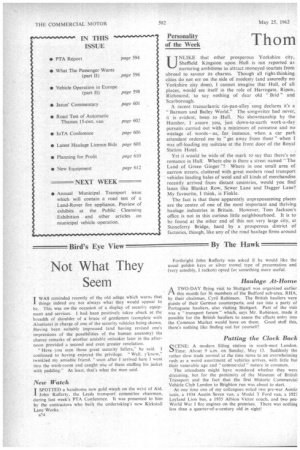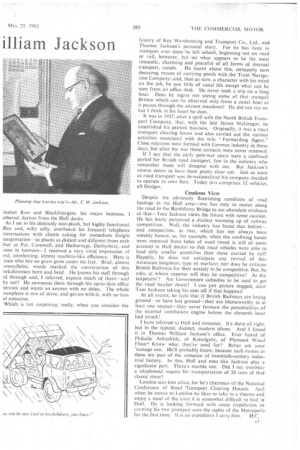Personality of the Week
Page 30

Page 31

If you've noticed an error in this article please click here to report it so we can fix it.
Thom
illiam Jackson UNLIKE that other prosperous Yorkshire city, Sheffield Kingston upon Hull is not reported as nurturing ambitions to attract moneyed tourists from abroad to savour its charms. Though all right-thinking cities do not err on the side of modesty (and assuredly no Yorkshire city does), I cannot imagine that Hull, of all places, would see itself in the role of Harrogate, Ripon, Richmond, to say nothing of dear old " Brid " and
Scarborough. ..
A recent transatlantic tin-pan-alley song declares it's a "Barnum and Bailey World." The songwriter had never, it is evident, been to Hull. No showmanship by the Humber, I assure you, just down-to-earth work-a-day pursuits carried out with a minimum of nonsense and no wastage of words—as, for instance, when a car park attendant ordered me to "get away from theer " when I. was off-loading my suitcase at the front door of the Royal Station Hotel.
Yet it would be wide of the mark to say that there's no romance in Hull. Where else is there a street named "The Land of Green Ginger "? Where in one small area of narrow streets, cluttered with great modern road transport vehicles loading bales of wool and all kinds of merchandise recently arrived from distant countries, would you find lanes like Blanket Row, Sewer Lane and Dagger Lane? My favourite, I think, is Finkle.
The fact is that these apparently unprepossessing places are the centre of one of the most important and thriving haulage industries in Britain. However, Tom Jackson's office is not in this curious little neighbourhood. It is to be found at the other end of this not •very large city, at Stoneferry Bridge, hard by a prosperous district Of factories, though, like any of the road haulage firms around
,lanket Row and Blackfriargate, his major business. I athered, derives from the Hull docks.
As I sat in his distinctly non-plush, but highly functional. ffice and, willy nilly, overheard his frequent telephone anversations with clients asking for immediate freight .ansportation—to places as distant and different from each ther as Par, Cornwall, and Hathersage, Derbyshire, and Dints in between—I received a very vivid impression of a rd, unrelenting, almost machine-like efficiency. Here is man who lets no grass grow under his feet. Brief, almost onosyllabic, words marked the conversation of this orkshireman born and bred. He knows his staff through ad through and, I inferred, expects much of them—and hy not? He summons them through his up-to-date office tercom and wants an answer with no delay. The whole mosphere is one of drive, and get-on-with-it, with no fuss id nonsense.
Which is not surprising, really, when you consider the history of Key Warehousing and Transport Co., Ltd., and Thomas Jackson's personal story. For he has been in transport ever since he left school, beginning not on road or rail, however, but on what appears to be the most romantic, charming and peaceful of all forms of internal transport, canals. He learnt about this, unhappily now decaying, means of carrying goods with the Trent Navigation Company; and, then as now, a character with his mind on the job, he saw little of canal life except what can be seen from an office desk. He never took a trip on a long boat. Does he regret not seeing some of that tranquil Britain which can he observed only from a canal boat as it passes through the ancient meadows? He did not say so, but I think in his heart he does.
It was in 1937, after a spell with the North British Transport Company, that, with the late James McGregor, he established his present business. Originally, it was a road transport clearing house and also carried out the various activities associated with the title " Forwarding Agent." Close relations were formed with German industry irt those days, but after the war those contacts were never renewed.
If I say that the early post-war years were a confused period for British road transport, few in the industry who remember them will disagree with me. But Jackson's course seems to have been pretty clear cut. Just as soon as road transport was de-nationalized his company decided to operate its own fleet. Today this comprises 32 vehicle's, all Dodges.
Cautious View
Despite the obviously flourishing condition of road haulage in the Hull area—one has only to motor along the road to the Boothferry Bridge to see abundant evidence of that—Tom Jackson views the future with some caution. He has lately perceived a distinct warming up of railway competition. Well, the industry has faced that before— and competition, at that, which has not always been notably honest, as, for example, when the confining bands were removed from bales of wool (wool is still of some account in Hull docks) so that road vehicles were able to load only smaller quantities than those carried by rail! Happily, he does not anticipate any revival of this American longshore type of warfare; nor does he criticize British Railways for their anxiety to be competitive. But, he asks, at whose expense will they be competitive? At the taxpayers'? Are Government subsidies to be used to get the road haulier down? I can just picture dogged, dour Torn Jackson taking his coat off if that happens!
At all events, he feels that if British Railways are losing ground--or have lost ground—they are blameworthy in at least one respect—they never foresaw the potentialities of the internal combusion engine before the eleventh hour had struck!
I have referred to Hull and romance. It's there all right, but in the typical, distinct, modern idiom. And I found it in Thomas William Jackson's office. Ever heard of Phthalic Anhydride, of Keiselguhr, of Plywood Wood Flour? Know what they're used for? Better ask your 'teenage son. He'll probably know, because such names as these are part of the romance of twentieth-century industrial history. In this, Hull and men like Jackson play a significant part. There's marble too. Did I not overhear a telephoned request for transportation of 20 tons of that classic stone?
London sees him often, for he's chairman of the National Conference of Road Transport Clearing Houses. And when he comes to London he likes to take in a theatre and enjoy a meal of the kind it is somewhat difficult to find in Hull. He is looking forward with some trepidation to s;acwing his two youngest sons the sights of the Metropolis for the first time. It is art expedition I envy him. H.C.












































































































